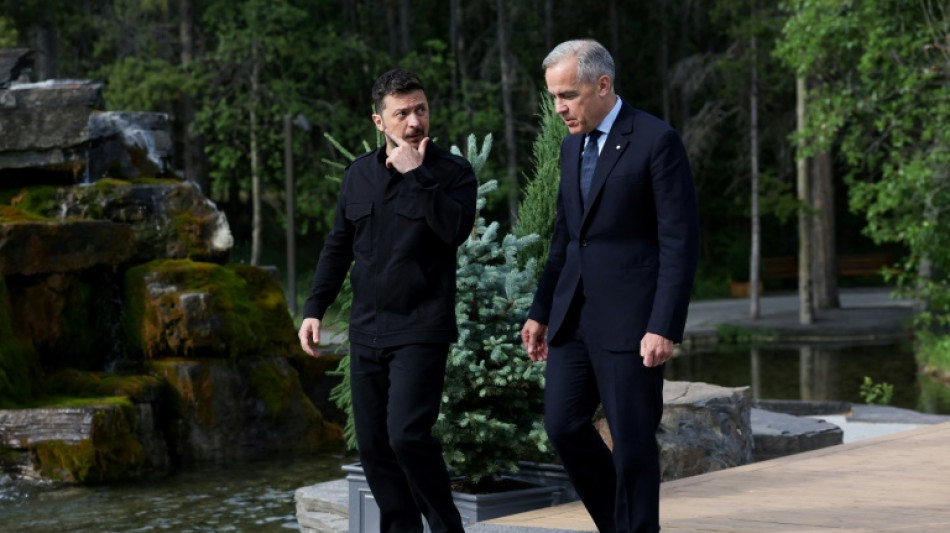
RBGPF
-1.2700

Group of Seven powers, holding talks Tuesday at a summit that Donald Trump left early, promised Ukrainian President Volodymyr Zelensky fresh support as Russia stepped up attacks on its neighbor.
The US president, who has had a volatile relationship with Zelensky and had been due to meet him, flew out of the summit in the Canadian Rockies late Monday to return to Washington to focus on the Israel-Iran conflict.
Zelensky arrived at the wooded mountain resort of Kananaskis after Russia ravaged Kyiv with one of the worst bombardments since it invaded in February 2022, killing at least 10 people in the capital.
Prime Minister Mark Carney, the host of the summit, welcomed Zelensky and announced Can$2 billion ($1.47bn) of military support, including drones and helicopters, for Ukraine.
"This underscores the importance of standing in total solidarity with Ukraine," Carney told him.
"We underscored the importance of using maximum pressure against Russia, who has refused to come to the table," Carney said.
Carney also announced a new Can$2.3 billion loan to Ukraine to help rebuild its infrastructure and public systems and joined Britain in tightening sanctions on Russia's so-called shadow fleet of ships used to circumvent international sanctions on its oil sales.
Britain said it wanted to ramp up economic pressure to show Russian President Vladimir Putin it was in his interest to end the war.
"These sanctions strike right at the heart of Putin's war machine, choking off his ability to continue his barbaric war in Ukraine," Prime Minister Keir Starmer said in a statement.
- US holding out -
US lawmakers have also drafted a package of new sanctions on Russia but Trump has been hesitant, saying he wants to preserve relations with Putin, whom he spoke to by telephone on the eve of the G7 summit.
Trump infamously berated Zelensky in the Oval Office on February 28, saying he was ungrateful for US aid, but has since voiced disappointment that Putin has rebuffed a US proposal for at least a temporary ceasefire.
Zelensky, his voice choked with emotion, told Carney that the latest Russian attack was a "big tragedy" for Ukrainian families and it showed the need for allies' support -- and made clear that he still backed Trump-led calls for negotiations.
"It's important for our soldiers to be strong in the battlefield -- to stay strong until Russia will be ready for the peace negotiations," Zelensky said next to Carney.
"We are ready for the peace negotiation -- unconditional ceasefire. For this we need pressure."
European Commission President Ursula von der Leyen told reporters that despite the attention to the Middle East crisis, "our focus on Ukraine will also persist and stay strong."
- Tough trade talks -
The G7 -- Britain, Canada, France, Germany, Italy, Japan and the United States -- was holding its first summit since the return to power of Trump, who is fond of assailing allies when they cross him.
Trump appeared in good spirits during his abbreviated visit, with no public dust-ups.
"Obviously with Trump gone the discussions might be a bit smoother, but they also have less impact with the most powerful nation not there," a diplomat from a G7 nation said on condition of anonymity.
Treasury Secretary Scott Bessent remained to represent the United States at the summit, where discussions have also focused heavily on Trump's attempts to radically overhaul the world's trading system.
Trump has vowed to slap sweeping tariffs on friends and foes alike on July 9, although he has postponed once.
The US president, speaking to reporters on his way back from the summit, complained that the European Union was not yet offering a "fair deal" on trade.
"We're either going to make a good deal or they'll just pay whatever we say they will pay," he said.
Von der Leyen said she still hoped for a negotiated solution and that talks were "intense and demanding."
Trump's negotiators have already sealed a deal with Britain and, outside of the G7, reached an agreement to lower tariffs with rival China.
Japanese Prime Minister Shigeru Ishiba said he had "frank" discussions with Trump on Monday but made clear the importance of automobile exports to the world's second-largest developed economy.
"As there are still some points where both sides disagree, we have not reached an agreement on the package as a whole," Ishiba told reporters.
O.Holub--TPP